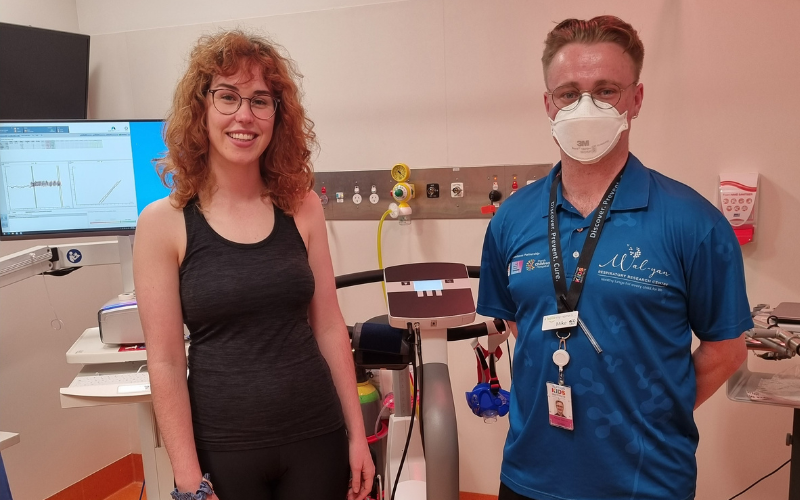
Natasha, who is a participant in the West Australian Lung Health in Prematurity (WALHIP) study, this week became the first person to receive a lung health assessment using new state-of-the-art lung function testing equipment at Perth Children’s Hospital.
Preterm birth can lead to breathing problems during childhood and into adult life.
The WALHIP study, being undertaken by the Children’s Lung Health team at The Kids Research Institute Australia, aims to better understand preterm lung disease by tracking preterm individuals from childhood and into early adult life.
Ultimately, the team is working to understand what predicts poorer outcomes, and what influences underlying preterm lung disease to help change this, so that one day every child born early can live a life free from respiratory disease.
Twenty-three-year-old Natasha, together with 199 other individuals who were born preterm, has taken part in this important study since she was 11 years old.
This amazing group of people has come to see the Children’s Lung Health team at different stages of their lives, including at four to seven years, nine to 12 years, and 16 to 23 years.
The latest phase of the follow up, which Natasha undertook this week, includes an assessment of exercise and physical activity levels in young adulthood, with the aim of identifying long-lasting effects of preterm birth.
Adding to the excitement of having this phase of the WALHIP study underway is the fact that all study participants will now undertake their assessments with new lung function testing equipment.
Program Manager of the Children’s Lung Health team, Dr Elizabeth Smith, said the new equipment is invaluable for the research work her team undertakes.
“Respiratory function testing is essential for the diagnosis, monitoring, and treatment of a range of conditions, including asthma, cystic fibrosis and the chronic lung disease of prematurity.
“However, these tests are highly specialised and require adapted equipment to be suitable for testing in children,” Dr Smith said.
Thanks to funding support from the Stan Perron Charitable Foundation, The Kids Research Institute Australia and the Wal-yan Respiratory Research Centre, we now have a range of new specialist respiratory function testing equipment, dedicated for research use, on hand.
“In addition, we have portable equipment available, to enable bedside and community-led research in rural and remote communities, which is vital for respiratory research.”
Natasha, who works in research herself, takes part in the study because she knows how important it is to have people participate in research. Natasha said her experience using the new equipment was ‘fantastic’.
“After completing some breathing tests and a body composition assessment, I was tested on the new exercise bike wearing a mask, which was able to assess how my lungs respond to exercise,” said Natasha.
All up, this follow up visit took around two and a half hours. The equipment was comfortable, simple to use, and the researchers were able to provide feedback at the time.
“Having undergone testing previously, there really was a noticeable difference having the new equipment – it takes a lot less time and there seemed to be less equipment-based error.”
The Children’s Lung Health team is a part of the Wal-yan Respiratory Research Centre - a powerhouse partnership between The Kids Research Institute Australia, Perth Children’s Hospital Foundation and Perth Children’s Hospital.
Learn more about the Children’s Lung Health team here
Find out about the Respiratory Physiology Platform here
